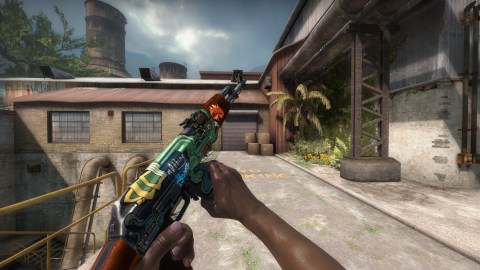Trump suggests connection between video games and mass shootings

Valve
- The president suggested that video games, in part, cause Americans to glorify violence.
- No solid body of research currently supports the claim that violent video games cause real-world violence.
- Research on video games has been historically messy, political and contentious.
In the wake of two mass shootings this weekend, President Donald Trump said Monday that the U.S. needs to “shine light on the dark recesses of the internet” and “stop the glorification of violence in our society.” One factor that’s driving violence, the president suggested, is “gruesome and grisly video games.”
It’s not the first time Trump has blamed video games and media as a primary cause of violence in the U.S. In fact, casually connecting violence to video games has become something of a Republican talking point in recent years. On Sunday, for instance, Texas Lieutenant Gov. Dan Patrick told “FOX & Friends” that the El Paso shooter was playing out a “super-soldier” fantasy.
“This was maybe a video game to this evil demon,” Patrick said. “A video game to him. He has no sense of humanity, no sense of life. He wanted to be a super soldier, for his Call of Duty game.”
Patrick noted the shooter’s manifesto, which describes fulfilling a “super soldier [Call of Duty] fantasy.” He then asked:
“How long are we going to ignore at the federal level. . . something about the video game industry?”
This kind of “it’s time to do something” response to the mass shootings that killed at least 31 people this weekend sounds almost identical to calls for increased gun control. But it’s likely a specious argument, because there’s no evidence showing that exposure to violent video games leads to violence in the real world — something even the U.S. Supreme Court noted in a 2011 ruling.
For a more recent example, a 2019 study published in the journal Royal Society Open Science found that teenagers who played video games weren’t more likely to behave aggressively.
“Despite interest in the topic by parents and policy-makers, the research has not demonstrated that there is cause for concern,” lead researchers Andrew Przybylski, director of research at the Oxford Internet Institute, told The Independent.
Admittedly, it’s not that simple though. Some studies have found persuasive connections between video games, and both the American Psychological Association and the American Academy of Pediatrics have noted such research, with the latter writing that video games “should not use human or other living targets or award points for killing, because this teaches children to associate pleasure and success with their ability to cause pain and suffering to others.”
Why the lack of consensus? One reason is methodological flaws. For instance, some studies might show a seemingly clear connection between playing violent video games and behaving violently, but it’s not clear that video games are causing that behavior. After all, kids who already have violent tendencies might just like playing violent video games. What’s more, analyses of past video game research has uncovered multiple instances of publication and citation bias. Add to the mix the replication crisis that’s for years been eroding long-held truisms in psychology research, and you can see that the field of video game research is, in short, pretty messy.
“The idea that violent video games drive real-world aggression is a popular one, but it hasn’t tested very well over time,” Przybylski told The Independent.
Christopher Ferguson, an associate professor and co-chairman of the Department of Psychology at Stetson University, echoed a similar view to CNN. He said that newer studies “with better methods” have generally failed to establish connections between virtual and real-life violence. In fact, one 2016 study found “evidence that violent games cause a modest reduction in crime.” The basic idea is that video games help keep young men in front of TV screens instead of on the streets where they might act violently.
Currently, Trump hasn’t offered details on how the government might regulate the video game industry, which was valued at nearly $135 billion in 2018.





